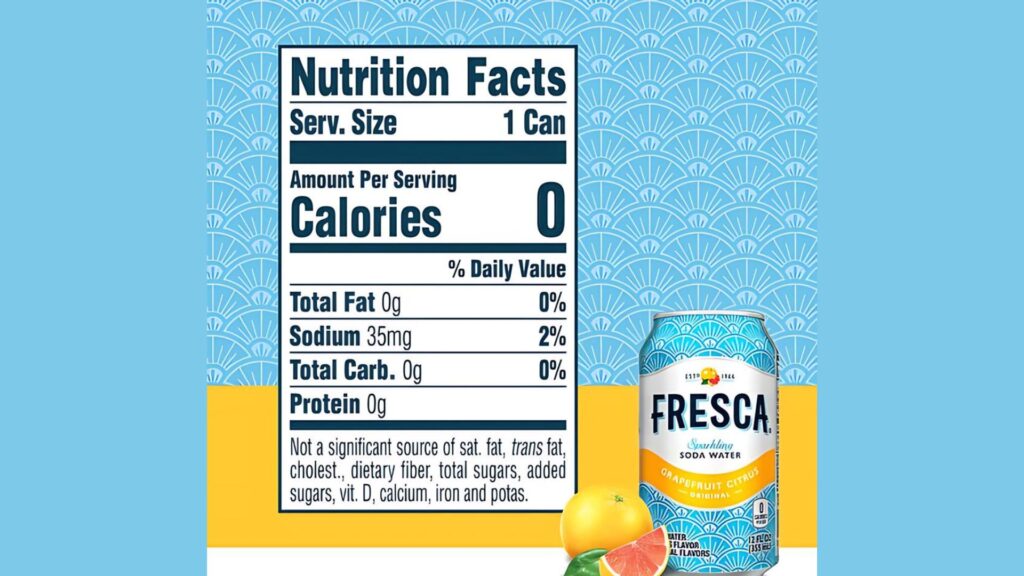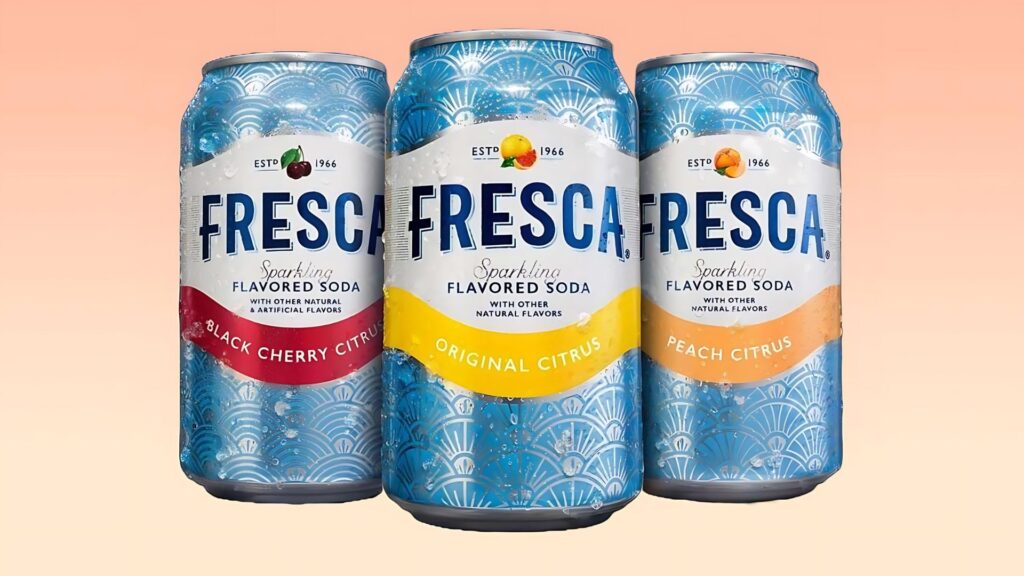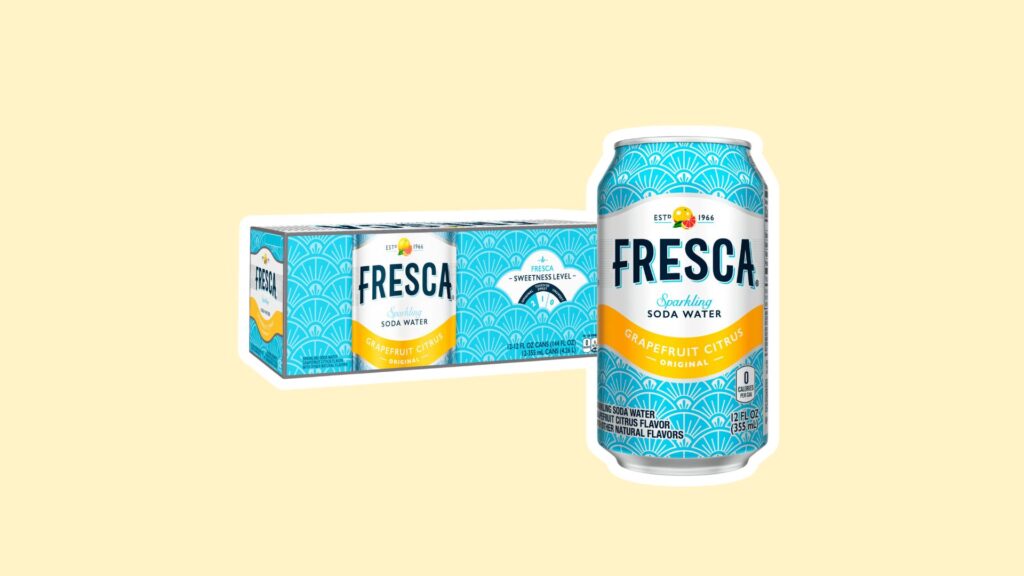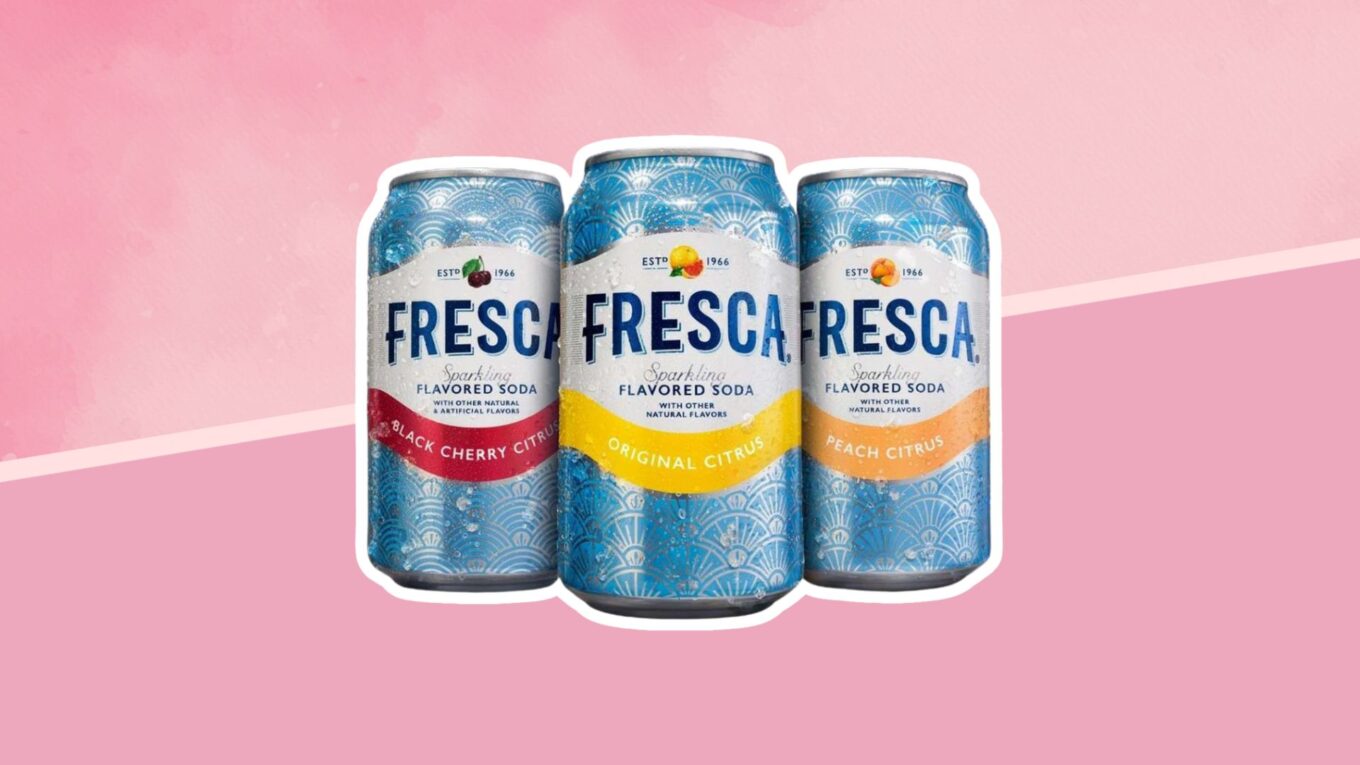Fresca, the popular zero-calorie soft drink, has gained attention for its refreshing taste and diet-friendly appeal.
However, with the abundance of artificially sweetened beverages on the market, you might wonder how Fresca compares to other soft drinks regarding health impact.
In this blog post, we’ll explore the key differences between Fresca and its competitors, examining ingredients, potential risks, and overall nutritional value.
By the end, you’ll understand where Fresca stands in the soft drinks landscape and be better equipped to make informed choices for your health and well-being.
Fresca- A Popular Zero Calorie Drink

Fresca is a Coca-Cola soda brand known for being sugar-free and calorie-free. It has a citrus flavor, often grapefruit, and is sweetened with artificial sweeteners instead of sugar.
Fresca has become a go-to choice for many seeking a refreshing, calorie-free beverage.
However, to make an informed decision about including Fresca in your diet, it’s crucial to understand its ingredients and their potential health implications.
Comparative Analysis: Fresca vs. Other Zero-Calorie Sodas
| Attribute | Fresca | Coca-Cola Zero Sugar | Pepsi Zero Sugar | Sprite Zero |
|---|---|---|---|---|
| Sweeteners | Aspartame, Acesulfame Potassium (Ace-K) | Aspartame, Acesulfame Potassium (Ace-K) | Aspartame, Acesulfame Potassium (Ace-K) | Aspartame, Acesulfame Potassium (Ace-K) |
| Calories | Zero | Zero | Zero | Zero |
| Flavor Profile | Citrus (Grapefruit) | Cola | Cola | Lemon-Lime |
| Preservatives | Potassium Benzoate | Potassium Benzoate, Sodium Benzoate | Potassium Benzoate | Potassium Benzoate |
| Acidity | Contains Citric Acid | Contains Phosphoric Acid | Contains Phosphoric Acid | Contains Citric Acid |
| Dental Health Risks | Moderate (due to citric acid) | High (due to phosphoric acid) | High (due to phosphoric acid) | Moderate (due to citric acid) |
| Health Concerns | Possible metabolic disruption, cancer risks (controversial) | Same as Fresca, potential bone density concerns | Similar to Coca-Cola Zero Sugar | Same as Fresca |
| Distinct Features | No caffeine | Contains caffeine | Contains caffeine | No caffeine |
| Target Audience | Health-conscious, prefers citrus flavors | Cola lovers seeking zero calories | Similar to Coca-Cola Zero Sugar | Those preferring a lemon-lime flavor without calories |
Core Composition of Fresca

Fresca, a popular zero-calorie soft drink, is known for its refreshing taste. However, it’s important to look closely at its ingredients to understand their potential health effects.
The main components of Fresca include:
1. Artificial Sweeteners
- Aspartame: This sugar substitute provides sweetness without calories. Some people may experience headaches after consuming it, and there are debates about its long-term safety.
- Acesulfame Potassium (Ace-K): Another zero-calorie sweetener used in Fresca. It has been questioned for its possible impact on metabolism and potential cancer risks, though more research is needed.
2. Citric Acid
Added for a tart, citrus flavor and to help preserve the drink. However, it can erode tooth enamel over time if consumed frequently, potentially leading to dental issues.
3. Potassium Benzoate
A preservative used to extend shelf life by preventing mold and bacteria growth. Under certain conditions, it can form benzene, a known carcinogen, but this is rare.
While Fresca offers a zero-calorie option, it’s crucial to remember that the absence of calories doesn’t necessarily mean it’s a healthy choice.
These artificial ingredients may affect the body in various ways, such as altering insulin response and influencing appetite.
Health Risks Associated with Fresca
While Fresca offers a refreshing, zero-calorie alternative to sugary drinks, it’s important to be aware of the potential health risks associated with its ingredients.
1. Dental Health Concerns
One of the main issues with consuming Fresca regularly is its potential impact on dental health.
Citric acid, a key ingredient in the drink, can gradually erode tooth enamel over time. This erosion makes teeth more vulnerable to decay, increasing the risk of cavities and sensitivity.
To minimize these effects, it’s advisable to rinse your mouth with water after drinking Fresca and to avoid brushing your teeth immediately after consumption, as this can further damage the softened enamel.
2. Artificial Sweeteners and Health
Fresca contains two artificial sweeteners: aspartame and acesulfame potassium.
Although regulatory agencies generally consider these sweeteners safe, some studies have raised concerns about their potential health risks. Aspartame has been linked to headaches and, in rare cases, more severe neurological symptoms.
Both sweeteners have also faced scrutiny over their possible connections to cancer and metabolic disruption, though more research is needed to confirm these associations.
People with phenylketonuria (PKU), a rare genetic disorder, should avoid aspartame altogether, as it can be harmful to their health.
3. Preservatives and Additives
Fresca includes preservatives such as potassium benzoate and EDTA to maintain its shelf life and appearance.
While these additives are approved for food and beverages, they have been associated with certain health concerns.
When combined with vitamin C, potassium benzoate can form benzene, a known carcinogen.
Although the levels of these preservatives in Fresca are regulated, it’s important to be aware of their presence and potential risks, especially for those with sensitivities or allergies.
Does Sparkling Water Cause Weight Gain?

Many people wonder if sparkling water, like that found in Fresca, can contribute to weight gain. This is a valid question, given these beverages’ carbonation and artificial sweeteners.
1. Carbonation and Fullness
The carbonation in sparkling water can create a temporary feeling of fullness, which may lead to reduced food intake in the short term. However, this effect is generally short-lived and may not have a significant long-term impact on weight control.
2. Artificial Sweeteners and Metabolism
While sparkling waters like Fresca are calorie-free, some studies suggest that artificial sweeteners might influence hunger and metabolic processes differently than plain water.
More research is needed to fully understand the long-term effects of these sweeteners on weight management.
3. Expert Consensus
Overall, health experts generally agree that sparkling water is unlikely to cause weight gain when consumed in moderation.
However, individual responses may vary, and it’s essential to consider the broader dietary context and lifestyle factors when assessing the impact of sparkling water on body weight.
Comparative Analysis: Fresca vs. Natural Alternatives
| Attribute | Fresca | Fruit-Infused Water | Herbal Tea | Coconut Water |
|---|---|---|---|---|
| Ingredients | Artificial sweeteners (aspartame, Ace-K), citric acid, preservatives. | Natural fruits, herbs, and water. No added artificial ingredients. | Natural herbs, spices, and water. No added sugars or artificial ingredients. | Pure coconut water, sometimes with added natural fruit juice. No artificial ingredients. |
| Sweeteners | Uses artificial sweeteners to provide a sweet taste without calories. | Naturally sweetened by fruits; no artificial sweeteners. | No sweeteners; naturally subtle flavors from herbs and spices. | Naturally sweet from the coconut; no artificial sweeteners. |
| Preservatives | Contains preservatives like potassium benzoate. | No preservatives; fresh ingredients used. | No preservatives; best consumed fresh. | Some brands contain preservatives; others are completely natural. |
| Acidity | Contains citric acid, which can erode tooth enamel. | Generally lower in acidity, gentler on teeth and digestion. | It varies with ingredients; it generally has low acidity unless citrus is added. | It is low in acidity and very gentle on the stomach and teeth. |
| Health Benefits | Zero calories but with potential metabolic and dental health risks. | Hydrating provides vitamins and antioxidants from fruits. Encourages increased water intake. | Depending on the herbs used, it can offer therapeutic benefits such as relaxation or digestion aid. | High in electrolytes, particularly potassium. Aids in hydration and recovery. |
| Chemical Additives | Includes chemical additives for flavor and preservation. | Free from chemicals, entirely natural. | Free from chemicals, it relies solely on natural ingredients. | Usually free from chemicals, but check labels for additives in some brands. |
| Overall Health Impact | It may impact metabolism and dental health negatively. | Supports overall health with hydration and natural nutrients. | Varies by type, but generally, positive health impacts from natural compounds in herbs. | Beneficial for hydration and providing natural nutrients, with few risks unless overconsumed. |
Role of Soft Drinks in Weight Management

1. Zero-Calorie Soft Drinks and Weight Loss
Zero-calorie soft drinks like Fresca are often marketed as alternatives to sugary beverages for those looking to manage their weight.
By replacing high-calorie drinks with zero-calorie options, individuals can reduce their overall caloric intake and support weight loss efforts.
2. The Psychology of Sweet Cravings
One potential benefit of zero-calorie soft drinks is their ability to satisfy cravings for sweet tastes without adding calories.
This psychological satisfaction may help individuals stick to their weight management goals by providing a low-calorie option when the desire for something sweet arises.
3. Artificial Sweeteners and Appetite
However, the physiological impact of artificial sweeteners found in drinks like Fresca is a topic of ongoing research.
Some studies suggest that these sweeteners can sometimes lead to increased appetite and cravings despite not providing calories. This effect may be due to their influence on insulin response and satiety signals in the body.
4. Weighing the Benefits and Drawbacks
While some research supports using zero-calorie soft drinks in weight management programs, other studies highlight potential drawbacks.
When incorporating these beverages into a weight loss plan, it’s important to consider individual responses and the overall dietary context.
Wrapping It Up
While Fresca and other soft drinks may offer a refreshing, zero-calorie alternative to sugary beverages, it’s crucial to be mindful of their potential health implications.
From the erosion of tooth enamel caused by citric acid to the ongoing debates surrounding artificial sweeteners, regular consumption of these drinks may pose risks to our overall well-being.
Although they might play a role in weight management when consumed in moderation, it’s essential to consider the broader impact on our health, including the potential for metabolic disruption and other long-term consequences.
Ultimately, the key to a healthy lifestyle is making informed choices and prioritizing our well-being.
So, the next time you reach for a can of Fresca or another soft drink, remember to balance enjoyment with understanding the potential risks.
Frequently Asked Questions
Has Fresca Stayed True to Its Original Ingredients?
Fresca has changed its ingredients over time, such as removing brominated vegetable oil (BVO) in recent years.
Why is Fresca Banned in Some Countries?
Fresca is not banned, but some countries restrict the use of certain artificial sweeteners, like cyclamate, in the drink.
Does Fresca Have Grapefruit Juice in It?
Fresca contains a small amount of concentrated grapefruit juice, but not enough to have a significant nutritional impact.




